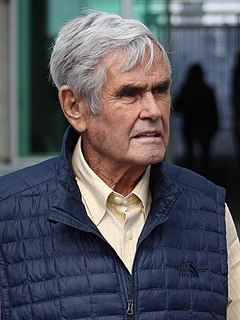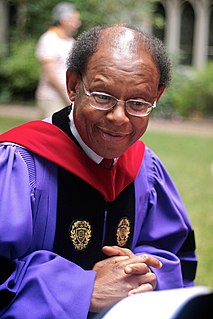A Quote by Wernher von Braun
Nature does not know extinction; all it knows is transformation. ... Everything science has taught me-and continues to teach me-strengthens my belief in the continuity of our spiritual existence after death. Nothing disappears without a trace.
Related Quotes
In this modern world of ours many people seem to think that science has somehow made such religious ideas as immortality untimely or old fashioned. I think science has a real surprise for the skeptics. Science, for instance, tells us that nothing in nature, not even the tiniest particle, can disappear without a trace. Nature does not know extinction. All it knows is transformation. If God applies this fundamental principle to the most minute and insignificant parts of His universe, doesn't it make sense to assume that He applies it to the masterpiece of His creation, the human soul?
In nature nothing remains constant. Everything is in a perpetual state of transformation, motion, and change. However, we discover that nothing simply surges up out of nothing without having antecedents that existed before. Likewise, nothing ever disappears without a trace, in the sense that it gives rise to absolutely nothing existing in later times.
Joseph Smith visited me a great deal after his death, and taught me many important principles. . . . Among other things, he told me to get the Spirit of God; that all of us needed it. . . . He said, "I want you to teach the people to get the Spirit of God. You cannot build up the Kingdom of God without that." . . . But how is it with the Holy Ghost? The Holy Ghost does not leave me if I do my duty. It does not leave any man who does his duty.
My happiest hours are those in which I think nothing, want nothing, when I do not even dream, but lose myself in some spurious vegetable torpor, moss growing on the surface of life. Without a trace of bitterness I savour my absurd awareness of being nothing, a mere foretaste of death and extinction.
I told myself: 'I am surrounded by unknown things.' I imagined man without ears, suspecting the existence of sound as we suspect so many hidden mysteries, man noting acoustic phenomena whose nature and provenance he cannot determine. And I grew afraid of everything around me – afraid of the air, afraid of the night. From the moment we can know almost nothing, and from the moment that everything is limitless, what remains? Does emptiness actually not exist? What does exist in this apparent emptiness?
How does God teach me love? By putting me around unlovely people. How does God teach me joy in the middle of grief? Not happiness, which is based on happenings. How does God teach me peace? Not when I am out fishing and everything is going my way and it doesn't get better than this. But in the middle of chaos. How does God teach me patience? By putting me in His waiting room.
My father probably taught me everything I know, aside from dialogue, which I think I get from my mom a lot more. He certainly didn't teach me everything he knew, but you know he has got this book out called "The Spooky Art," which is essentially an advanced book on writing and it's not... You know it's not ABC, but it's for people who feel that bug and know that they're writers and are willing to put in that time alone. Pretty much the vast majority of what he taught me you can find in that book.
For me, spirituality includes the belief in things larger than ourselves, an appreciation of nature and beauty, a sensitivity to the world, a feeling of shared connection with other living things, a desire to help people less fortunate than ourselves. All of these things can occur with or without God. I do not believe in the existence of God, but I consider myself a spiritual person in the manner I have just described. I call myself a spiritual atheist. I would imagine that many people are spiritual atheists.
Without going out-of-doors, one can know all he needs to know. Without even looking out of his window, one can grasp the nature of everything. Without going beyond his own nature, one can achieve ultimate wisdom. Therefore, the intelligent man knows all he needs to know without going away, And sees all he needs to see without looking elsewhere, And does all he needs to do wihout undue exertion.
Christianity can be described as a theological materialism: It is that which transforms our material existence. If our faith does not throw us into the arms of the world, if it does not lead to our experience of responsibility, love, celebration, and our commitment to transformation, then, whatever we call it, we have nothing but an empty shell.
I come from a family of conservation activists, and so I've had a strong connection to nature all my life. My father has been a leader within the movement for over thirty years and has taught most of what I know about environmental conservation. While he would always take me hiking, camping, and rafting, he also taught me that the spiritual value of the outdoors alone is not enough to save nature against economic interests.




































